Shea butter is one of the few products I can think of that is more commonly used as a beauty product yet it can readily and healthily be used in our food too.
Most common beauty products we wouldn’t dare put into our food since they’re full of unpronounceable chemicals.
Shea butter, on the other hand, makes sense – it’s healthy, natural, and worth considering as a healthy staple to add to your life.
What is Shea Butter?
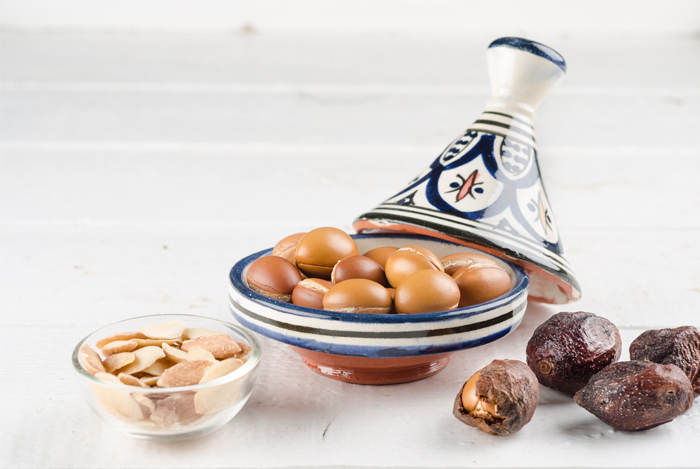
Shea butter comes from the fruit of the Shea Nut Tree, which grows in West Africa.
The fruit of the Shea Nut Tree has a high nutritional value.
When dried and separated from the outer shell, it can be crushed, roasted, and grinded down to be separated from the Shea Nut Fruit’s oils.
The resulting creamy paste, shea butter, is an edible oil that is used in a number of foods, including chocolate, which only adds to its nutritional properties and texture.
And, as you probably already know, shea butter is also used as a highly effective moisturizer and skin protectant.
Nutrition
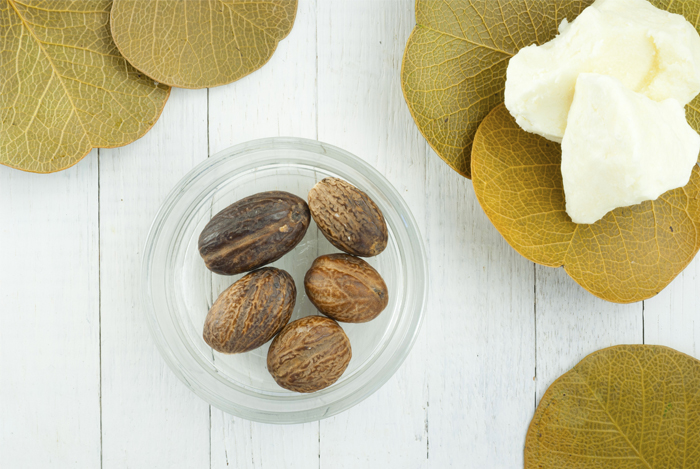
Shea Nuts and shea butter are both good sources of Vitamins A and E, antioxidants, and essential fatty acids, all of which provide important health benefits.
Vitamin A – Vitamin A plays important roles related to bone growth, immune health, and reproduction, as well as aiding in eye health. Though typically consumed in balanced diets, if you have a diet lacking in this important vitamin, adding shea butter to your cooking can help mitigate a deficiency of this nutrient.
Vitamin E – Vitamin E helps maintain bone, heart, and organ tissue, as well as aid in skin and brain health. It can also reduce the risks of age-related eye problems in the long run.
Antioxidants – Shea butter contains antioxidants such as catechins (also found in green tea and cinnamon). As you may recall, these antioxidants help combat the aging process and provide many health benefits including the prevention of certain diseases and cancers.
Essential Fatty Acids – The majority of shea butter’s fatty acid profile is made up of stearic and oleic acids. Substituting trans fats, or man-made fats, with stearic acids can significantly reduce your risk of chronic diseases.
On top of that, diets with higher amounts of oleic acids have many benefits, including better diabetes control and insulin regulation.
It’s pretty easy to see that we can benefit from adding shea butter into our lives, but let’s take a deeper look into some specific benefits.
Shea Butter is Anti-Inflammatory

Do you have frequent pains? Any itchiness? Do your joints hurt? Are you worried about wrinkles?
Well, it’s all part of getting old, and all a result of inflammation within the body. These things happen naturally for everyone, but the things we do in life, and the things we choose to eat can help.
Scientists at Nihon University studied the effect of shea fats on inflammation in mice and for “marked anti-inflammatory activity.” The study found that shea nuts and shea butter have significant amounts of both anti-inflammatory and anti-tumor materials.
So adding shea into your diet and lifestyle can help improve your youthfulness and protect your immune system from inflammation.
Rebalance Cholesterol Levels
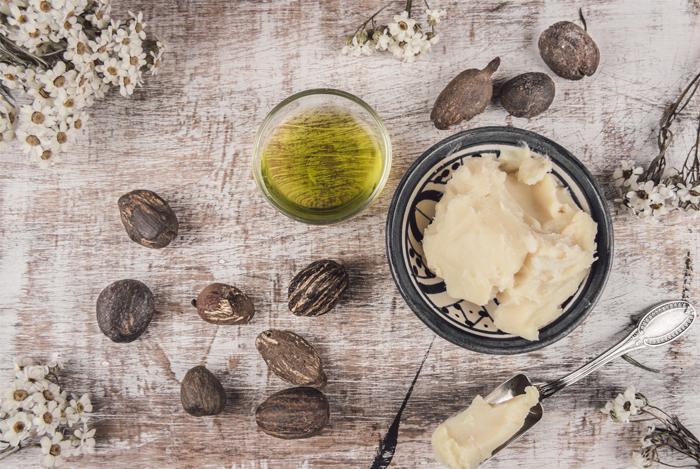
Can you eat fat with a beneficial effect on your cholesterol levels?
The answer is of course yes, you can.
We’ve talked about it with other good oils like coconut oil, as well as fat-rich foods like avocados.
Scientists at the American Society for Clinical Nutrition found that compared to palm oil and sunflower oil, shea butter favorably affects blood lipids.
Now, this is not your free pass to fill your diet with shea butter, but considering it as a replacement for other oils may make sense since it can help rebalance your cholesterol levels.
Antioxidant Rich

As I mentioned above, shea butter is rich in antioxidants including both polyphenols (plant –based micronutrients) like catechins, and cinnamic esters.
To give you a quick refresher, it may be useful to explain in brief how antioxidants work to make you healthier and look younger.
Dr K. Sandeep Prabhu at Penn State University explains broadly that antioxidants have the “ability to neutralize harmful molecules in our cells.” More specifically, these harmful molecules are called “free radicals.”
Free radicals can cause negative reactions in our bodies because unlike many other molecules, they contain unpaired electrons.
Prabhu states, “The unpaired electrons make free radicals highly reactive, and in this state, they can cause damage by attacking the components of our cells, and can even cause cancer.”
What you need to know is antioxidants neutralize free radicals, and as a result can provide numerous health benefits.
As an Oil Substitute
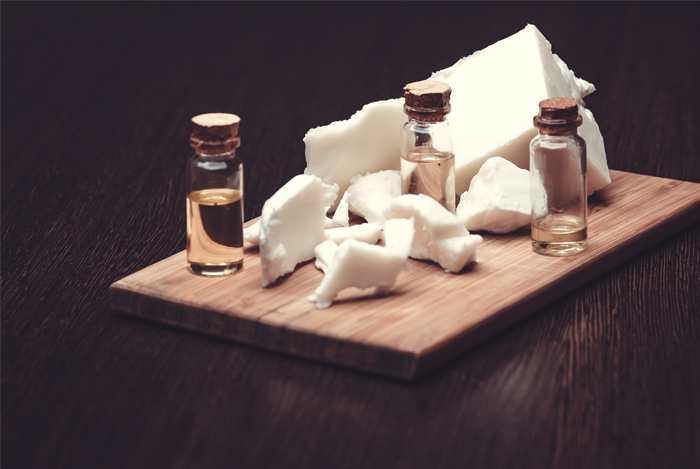
Now that we’ve gone over some of the great benefits of shea butter, let’s talk about how to eat it.
Typically, you’d be using shea butter as an oil substitute. The creamy solid can be used in the place of lard too, as well as in baked goods.
You can also try adding a dollop of raw, unrefined shea butter into smoothies, or even spread it on toast.
The easiest way would be to melt it onto a pan in the place of conventional butter before you start cooking.
To be frank, shea butter is infrequently used or seen as a food product, representing less than 0.1% of total edible oils in the market. This is, despite its benefits, because people still see it as a chiefly cosmetic product only.
As a Moisturizer
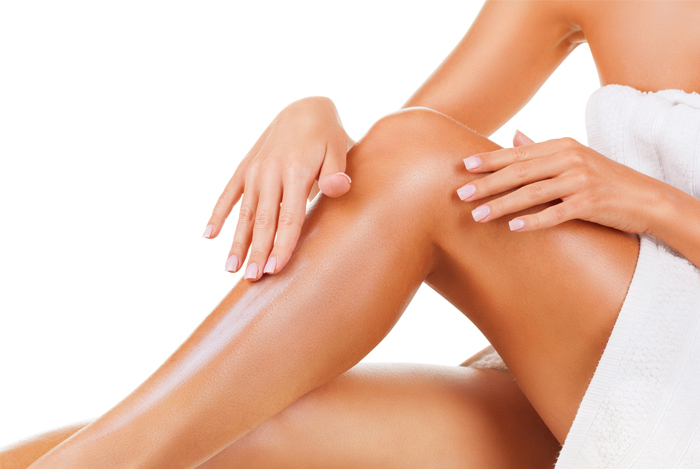
No review on shea butter would be complete without an overview of how it benefits the skin.
Since it’s safe enough for the stomach, it’s certainly safe enough for the skin.
Dry Skin – Shea butter is commonly used as a moisturizer, but it is clinically effective and shown to be able to treat mild to moderate eczema, or actual inflammation of the skin.
A study in the Journal of Cosmetic Dermatology showed that the anti-inflammatory effects were helpful in reducing signs and symptoms of eczema in human subjects.
Collagen Production – The natural vitamin A in shea butter helps to promote the production of collagen, the main structural protein that builds up connective tissue like skin.
This promotes skin strength and growth, while retaining natural oils.
UV Protection – Shea butter’s composition and antioxidants helps to protect against free-radical creation by UV radiation.
It’s interesting to note the types of things we are willing to either put into our mouths or into our bodies. If something is safe for your skin, would you eat it? If it is safe to eat, would it be safe on your skin?
Quality
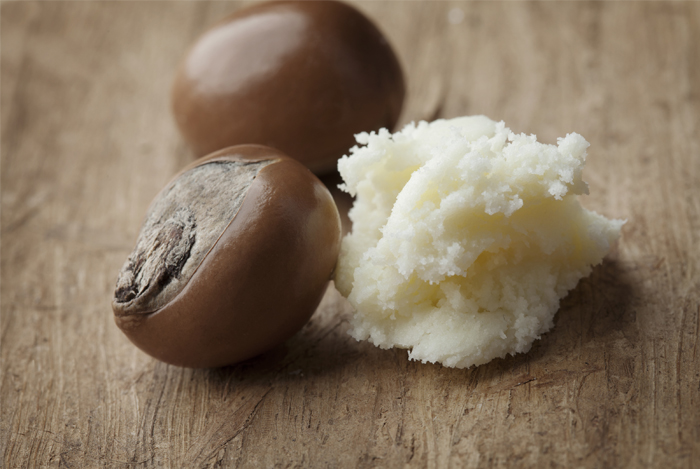
Most shea butter you can buy comes in various grades and quality, so how do we find the right choice to try?
Unrefined shea butter is prepared without the use of processing chemicals or preservatives.
Shea butter is naturally a beige, ivory color and has a nutty smell.
On the other hand, refined shea butter tends to be bleached white and odor free.
While it may look better on the surface, refined Shea butter lacks the benefits of its raw counterpart.
Shea butter is also split into various grades, “A” through “E.”
Grade “A” shea butter is of the highest quality, raw, and unrefined. The closer you get to “E,” the more processed it becomes.
Final Thoughts
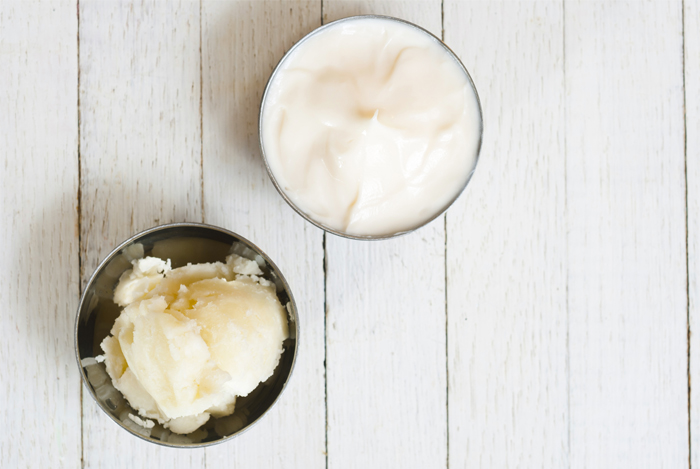
Like most products, shea butter comes at a variety of price points and levels of quality.
As mentioned above, your best bet is to get raw, unrefined shea butter that hasn’t been changed or reduced in nutritional value through the refinement process.
While those with tree nut allergies may consider staying clear, there is limited data indicating that shea nut products would induce allergic reaction. So you’re probably fine but should consult your doctor to be safe.
Do you use Shea Butter for cooking? I’d love to hear if you have any tips on how to incorporate it into your diet!
The post Why Shea Butter Is Not Just For Your Skin appeared first on Nutrition Secrets.
http://www.nutritionsecrets.com/why-shea-butter-is-not-just-for-your-skin/
No comments:
Post a Comment